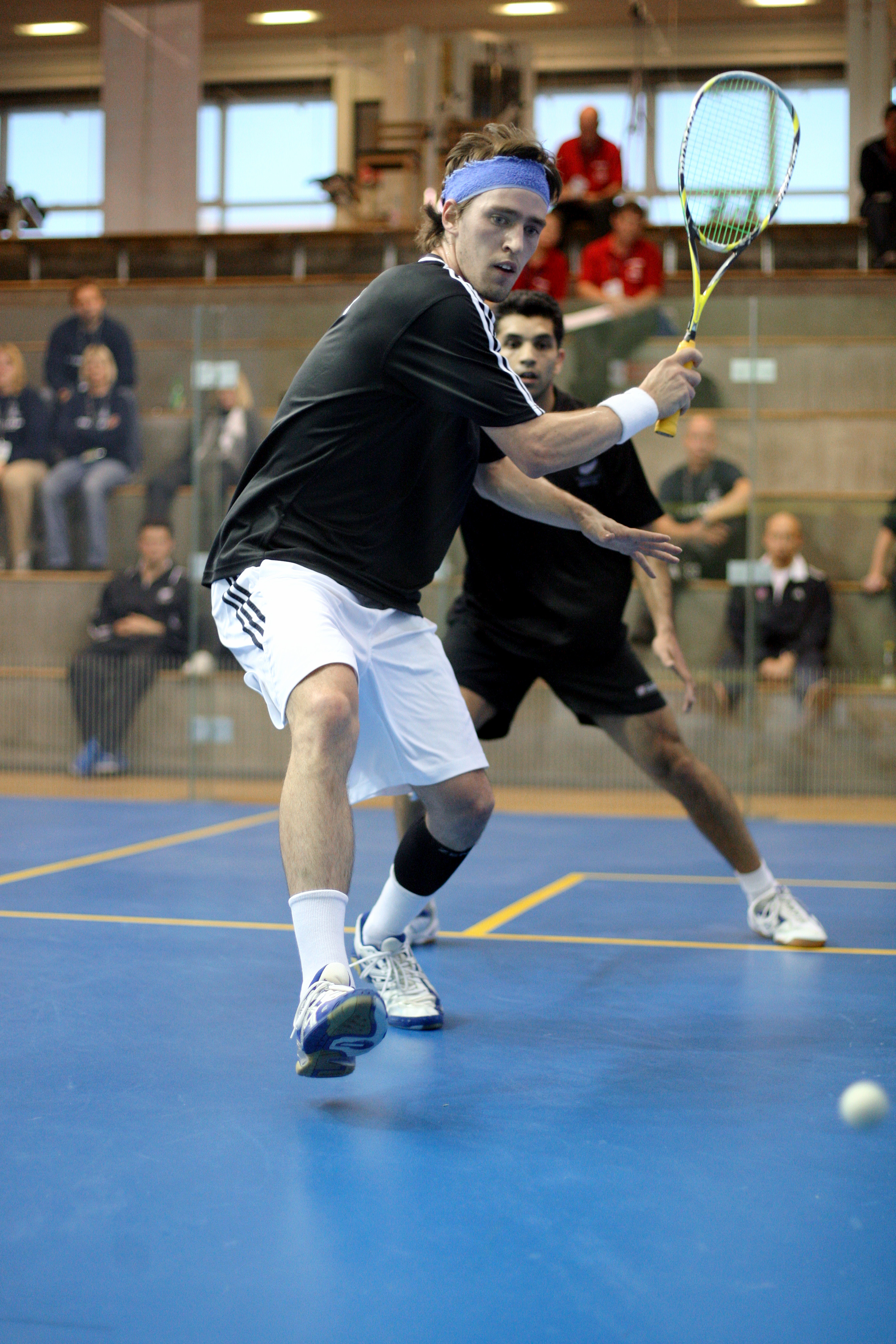By Jay D. Prince and Preston Quick
Photos by Steve Line/SquashPics.com
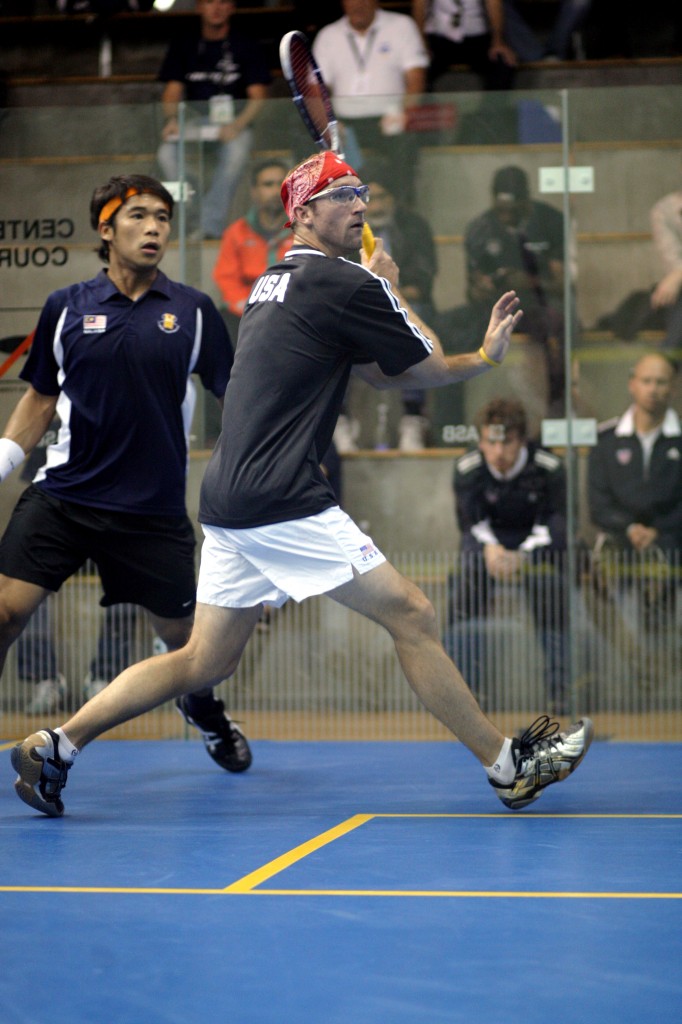
For years, the question has been asked: “When will an American reach the top-10 in the men’s World Rankings?” Along with that has been the question: “Will an American men’s team ever crack the top-10 in the World Team Championships.” After the US team’s performance in Odense, Denmark, in early October, the answer to that latter question has to be a resounding yes.
In 2005, the American men finished No. 13 in Islamabad. Two years later, the team matched their No. 14 seeding in Chennai, India.
Seeded No. 12 in Denmark, the young American trio of Julian Illingworth, Gilly Lane and Chris Gordon, and veteran Preston Quick, were chasing the best finish by an American men’s team in 25 years. To do so, a pool play win over Finland—their first match of the event—was a must. A loss to Finland would all but knock the US out of the top-16 since Malaysia was in the same pool and featured two players in the world’s top-20 rankings.
Leading off the opening tie was Illingworth against Olli Tuominen. In 2008, Illingworth beat the Fin, 3-1, in the Tournament of Champions, so Illingworth went into the match with some confidence. But Tuominen came out quickly and neutralized Illingworth’s shot-making abilities. Though Illingworth took a game, Tuominen won the match 3-1.
Up next was Gordon at No. 3 against Matias Tuomi, ranked nearly 100 places lower. Despite a strong start in the first and second games, Gordon dropped them both leaving the US team in a precarious position. Perhaps Gordon simply needed the pressure to get him going, because he promptly found himself staring at match ball, down 10-8 in the third game in spite of coming out with renewed energy early in the game. Two saved match balls later, followed by a crushing low backhand, and Gordon finally had an opportunity to win the game and climb back into the match. He wouldn’t need a second chance, as he won the game after a gruelling point, then conitnued with the winning strategy to win the fourth game 11-9 and finally the fifth to draw the US even with the Fins.
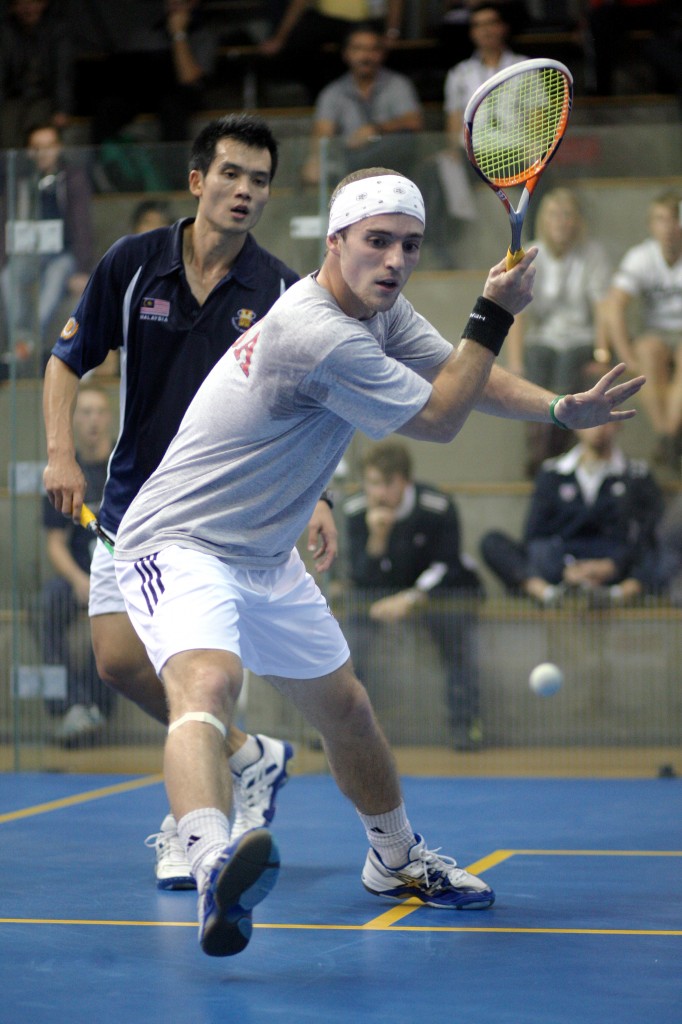
At No. 2, Gilly Lane wasted little time in securing the American team’s first tie in pool play. Though the first game was close, Lane won it 11-9 and, in doing so, wore down Henrik Mustonen who gave little resistance in the last two games.
Because of the win over Finland, the US team was assured a place in the top-16, even before playing Malayasia who comfortably beat the Americans in all three matches. What was unexpected was that South Africa, seeded No. 11, would beat Pakistan, seeded No. 5, in pool play. That match meant the Americans would realistically have a shot at reaching the top-8 if they could knock off South Africa.
Leading off were the No. 2’s with former top-20 player Rodney Durbach taking his experience on court against Lane. After trading the first two games, Durbach was clearly tired but managed to snatch the third game, 11-7. And though Lane played well in the fourth, picking up balls all over the court and visibly wearing down Durbach, Durbach ultimately won the fourth to stake South Africa to a 1-0 lead.
At No. 1, Illingworth and Stephen Coppinger played a brutal opening game that Coppinger won 15-13, but it was Illingworth who came out on top by winning the next three, all by just two points.
So it was up to the No. 3’s to determine which team would move on.
Clinton Leeuw had won the pivotal match against Pakistan the day before, but clearly had plenty left in the tank for Gordon by winning the opener, 11-8. Not to be outdone, Gordon fired back in the second, winning 11-9. Both players raised their games to new heights in the third and fourth, but it was Leeuw who was just a touch better, winning both and putting South Africa through to the quarterfinals.
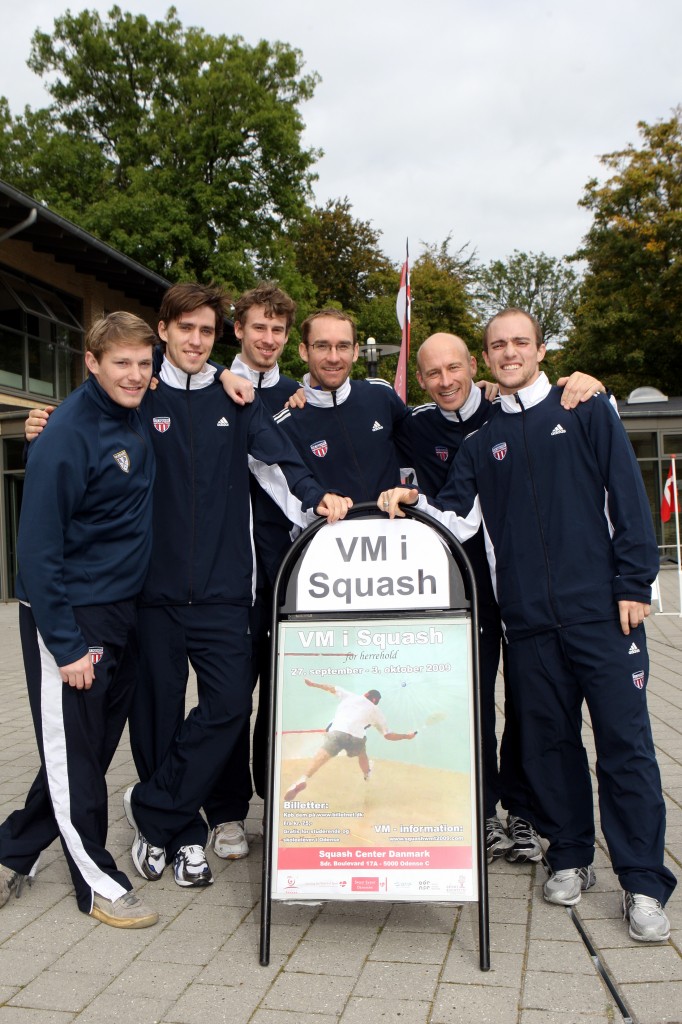
While the loss to South Africa was disappointing, it was four hours of spectacular squash and the US still had realistic chances at a top-12 finish. But to do so, they Americans would have to knock off the Netherlands.
Illingworth, feeling a little tight from four tough matches in a row, was unable to get his body moving the way he would have liked and fell in the opener to Laurens Anjema at No. 1. But Lane, who has been based in Amsterdam since finishing college, took on his frequent training partner, Piedro Schweertman. And Lane made quick work of Schweertman to, once again, put the tie in Gordon’s hands. And Gordon hadn’t expected to play at all.
Gordon, after winning the first game 15-13 and dropping the second, 11-8, put the team on his shoulders and won the third and fourth, 11-8, 11-8. Not only did the win over the Dutch guarantee a top-12 finish, but the US team still had an opportunity to reach the top-10.
To do so, they would have to beat New Zealand, a team seeded No. 10. At No. 3, Preston Quick struggled to get things going until midway through the third game, but ultimately fell 3-0. Illingworth, who lost to the Kiwi No. 1, Kashif Shuja, in the team championships in 2007, secured a critical point for the Americans by winning 3-1. But at No. 2, a drained Lane couldn’t overcome Campbell Grayson who won in three straight-forward game.
On the heels of the disppointing loss to New Zealand, the US team faced Germany on the last day of the event. Illingworth led off against Simon Roesner but fell in five, and Quick lost a tight four-game match against Stefan Leifels.
After a solid performance in Denmark, the 2009 US men’s team did what none other had done in recent memory—served notice to the world that the Amricans will walk through the top-10 door soon. And they might not knock first.
Egypt Clinch Men’s Title
Favorites Egypt clinched the 22nd Men’s World Team Squash Championship title in Denmark—but the three-man team, which included three of the world’s top four players, was taken the full distance before beating third seeds France 2/1 in the climax of the biennial World Squash Federation event at Squash Center Denmark in the city of Odense.
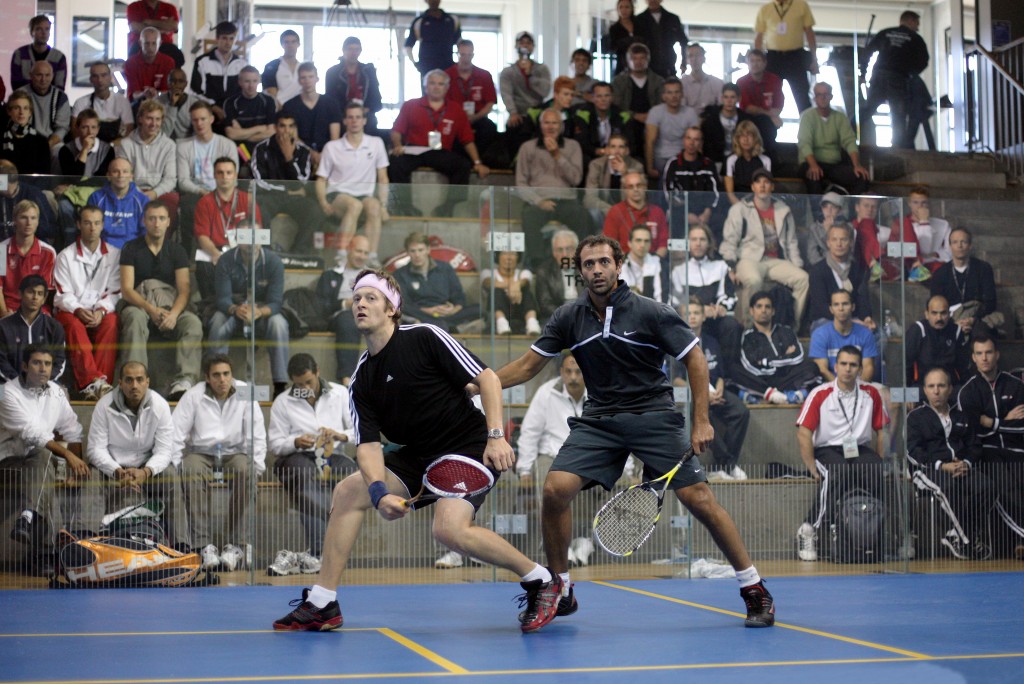
French number one Gregory Gaultier, the World No. 2, put the underdogs into an unexpected lead when he recovered from a game down to beat World No. 1 Karim Darwish (8-11, 11-5, 11-8, 11-2) in 53 minutes—a win that avenged the 26-year-old from Aix-en-Provence’s defeat in the previous week’s final of the PSA Super Series Platinum Sky Open in Cairo.
Ramy Ashour, the 2008 world champion from Cairo, soon brought Egypt back into contention by defeating France’s third string Renan Lavigne 11-3, 11-4, 11-5 in just 23 minutes.
The decider featured Egypt’s Amr Shabana and Frenchman Thierry Lincou, both former world champions and world number ones, and two of the game’s most respected players. And the match could not have been more dramatic—with both players calling upon all their vast experience in an attempt clinch the title for their countries.
Honors were shared after the first two games—and Lincou had game balls from 10-7 in the third and 10-5 in the fourth.
But a determined Shabana—a man not previously known for producing his best in team competitions—dug deeper than ever before to overcome his French opponent 11-6, 7-11, 12-10, 12-10 after 66 long minutes to claim the title for Egypt.
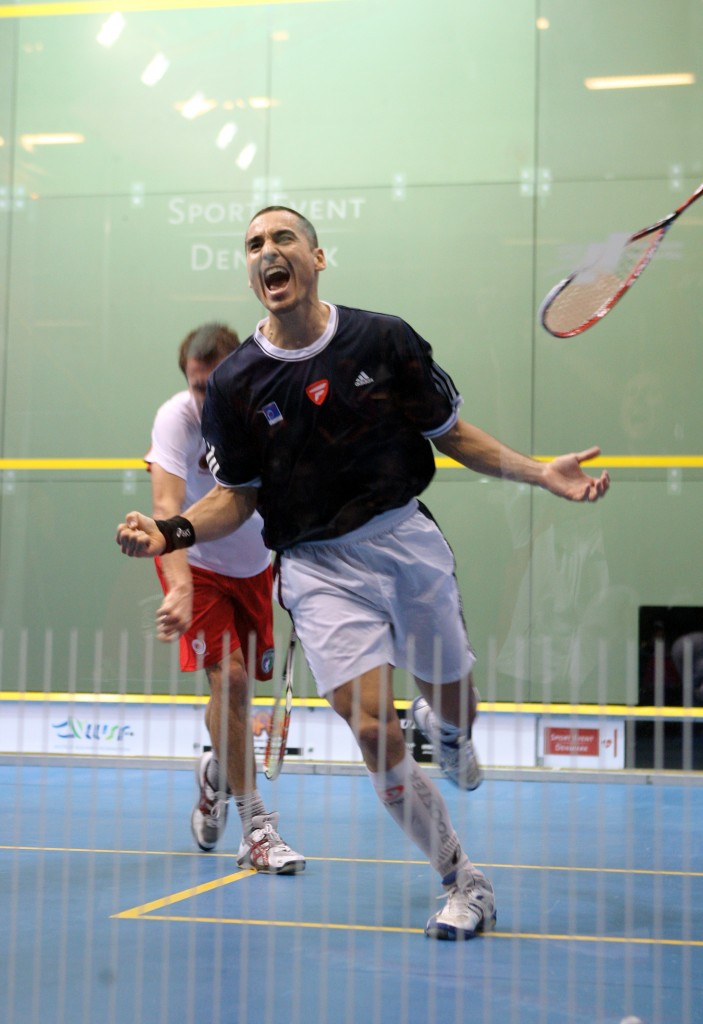
It was the Egyptians fourth time in the final since 1999, but only the second time that the now dominant nation in world squash has won the prestigious men’s world title.
“There was so much pressure on us, everybody was telling us, you must win, you must win,” an exhilarated Shabana told www.squashsite.co.uk afterwards. “So it’s such a relief to actually win the competition, after so many years trying – especially against France, a team with an amazing spirit.
“It means the world to me to win that title, after 10 years not winning it.”
Ramy Ashour, the 22-year-old World No. 4, who, incredibly, found himself playing third string for his country, added, “This is such a crucial moment for us, this is going to be a turning point for Egyptian Squash—and for Shabana, Karim, Wael, and myself, this is massive for us.
“We are so proud to have taken the title today, and we hope we are going to keep the cup for many, many years to come!”
Defending champions England, beaten by France in the semifinals, suffered further ignominy in the playoff for third place when they lost to fourth seeds Australia. The second seeds were weakened during the event by an ankle injury sustained by squad number one, Nick Matthew, which ultimately ruled the world No. 5 out of the rest of the competition.


